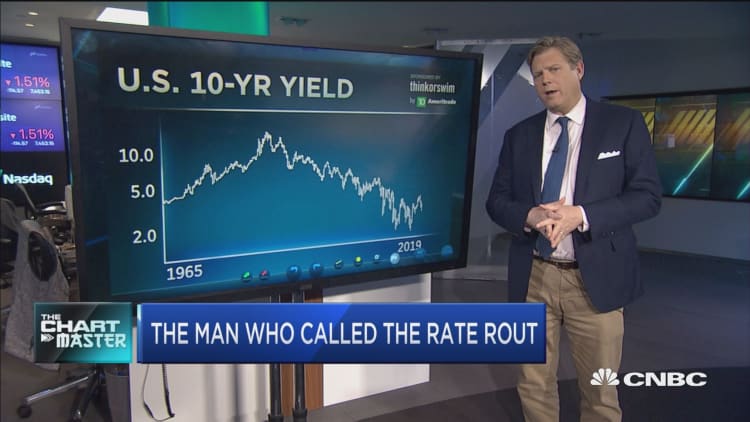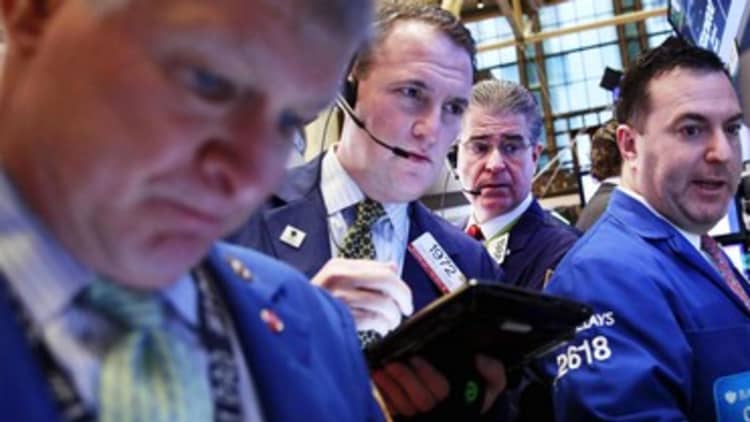The bond market is digging in for a long period of low interest rates, and just how low they go could be up to President Donald Trump.
The president, who had been pushing for Fed rate cuts, may get his wish, after his threat of Mexican tariffs prompted a number of Wall Street economists to now forecast two Fed interest rate cuts this year, after not expecting any before last Thursday. The economists point to slowing economic data, reduced business spending and uncertainty around the impact of tariffs on the economy.

Treasury yields have been falling over the past month, as investors worried that the trade war between the U.S. and China could be extended and more economically damaging. But it was Trump's threat to put tariffs on all Mexican exports unless its government cracks down on immigrants that abruptly changed Wall Street's view on interest rates and the Fed last Thursday.
"The assumption that cooler heads would prevail has been pushed aside...It may be the case that is still the outcome but it really sounds like the president is quite willing to move forward with higher tariffs," said Mark Cabana, head of U.S. short rate strategy at Bank of America Merrill Lynch. "He doesn't see it as a bad outcome or at least not as bad an outcome, as the rate market does."
JP Morgan's shocking forecast
Bond pros say the widely-watched 10-year yield could easily dip to 2% or below, after it touched 2.06% Monday, and J.P. Morgan Chase strategists say their target is now 1.75% for year end. That forecast came as a number of Wall Street firms, including J.P. Morgan and Barclays switched their view to two Fed rate cuts this year, from none previously.
For context, the 10-year yield was at 2.55% at the beginning of May, and at the beginning of the year, many strategists believed the Fed would be raising interest rates this year, and the 10-year would be above 3%. Yields move opposite price, and the 10-year yield is broadly watched because it is associated with lending rates, particularly home mortgages.
Jim Caron, portfolio manager at Morgan Stanley Investment Management, said he sees the 10-year falling below 2% on heightened uncertainty, but not way below, since he is also not anticipating a recession. But he, like others, says the bond market is now reflecting a much slower growth environment than some forecasts might reflect.
"1.85/1.90 to me is within the realm of reasonableness. There's no magic numbers here. It's really a question of if you downgrade growth, downgrade inflation expectations, your Fed expectations and risk premia. All of that is pointed down for high quality fixed income, so prices are going up," he said.
Strategists said the fact that the Mexican tariffs are not tied to trade issues makes them even more random, and risky.
"It shows that he sees this as a tool that can be used for broader policy purposes, and you can have a trade agreement in place, and he will still feel like it's appropriate to make a one off adjustment to tariff policy. And he's relatively unchecked on the grounds he's using these tariffs," said Cabana. Strategists have said the three way trade deal between the U.S., Canada and Mexico could now be at even more risk of never reaching approval.
Caron said the Mexican tariffs injected a level of uncertainty into the market that will be difficult to repair, even if the tariffs are never acted on. "The bottom line is all of this makes it difficult to be an investor because I am now looking at extraneous items, outside the market. To make an informed economic decision, which is making it very difficult..[and] why you become more defensive. You raise more cash and you basically start to become more defensive," Caron said.

Mohamed El-Erian, Allianz chief economic advisor, said on CNBC that bond market volatility is higher than that of the stock market. He said that's because the market is looking forward to a period of unusual uncertainty.
"I think it means an economic outlook that is more vulnerable, I think it means market technicals that are more fragile, and it involves a higher risk of a spill back from disrupted markets to the economy. It's a different outlook than it was last week, and let's see whether we can get back to where we were before," said El-Erian.
Rate cut 'warranted soon'
Michael Schumacher, director strategy at Wells Fargo, said market pros are now watching Fed speakers for guidance. Fed Chair Jerome Powell speaks Tuesday, and Fed Vice Chair Richard Clarida will appear on CNBC.
St. Louis Fed President James Bullard said on Monday that a rate cut could be "warranted soon," knocking yields slightly lower.
"The bond market has gotten a lot more nervous in the last week, pricing 57 basis points of easing this year," said Schumacher, referring to fed funds futures. The Fed meets June 18 but is not expected to take action.
"You get to the end of July, and there aren't that many meetings left. They better get moving quickly if they're going to justify that market call," he said, adding he does not expect a rate cut. Schumacher also does not expect the 10-year to go below 2%.
As yields continued to slide Monday, stocks were lower with the Dow and slightly lower, and Nasdaq off more than 1.7% as FANG names fell.
"It seems the bond market has gotten more nervous relative to stocks in the last week...If Trump does ride to the rescue of the stock market, and stocks go up 3 or 4% quickly, that would be about 10 to 15 basis points in the 10-year yield," he said. "That could happen at any time. He's an unpredictable guy."


